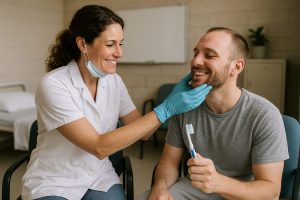Why Oral Care Should Be Part of Every Rehab Program
 When we think of rehabilitation programs, most of us picture physical therapy, counseling, medication management, or nutritional support. Oral health rarely makes the list. Yet dental care is deeply connected to both physical and emotional well-being. Ignoring it in a rehab setting can slow progress and even lead to relapse. For recovery programs to be truly holistic, they should treat the mouth with the same care as the rest of the body—a point often reflected in dentist Chicago reviews that emphasize the importance of comprehensive care.
When we think of rehabilitation programs, most of us picture physical therapy, counseling, medication management, or nutritional support. Oral health rarely makes the list. Yet dental care is deeply connected to both physical and emotional well-being. Ignoring it in a rehab setting can slow progress and even lead to relapse. For recovery programs to be truly holistic, they should treat the mouth with the same care as the rest of the body—a point often reflected in dentist Chicago reviews that emphasize the importance of comprehensive care.
The Overlooked Link Between Oral Health and Recovery
Substance use, chronic illness, and injury often leave a lasting mark on teeth and gums. Many people entering rehab have untreated cavities, gum disease, or missing teeth. Some drugs dry out the mouth, making decay worse. Others erode enamel or increase sugar cravings. Add in long stretches without regular dental visits, and oral health can be in crisis by the time recovery begins.
These problems don’t stay isolated to the mouth. Oral infections spread bacteria into the bloodstream, straining the immune system. Painful teeth make it harder to eat well, which is crucial for people recovering from illness or injury. Poor oral health also impacts sleep, energy, and focus—things every patient in recovery needs. By the time someone arrives at rehab, dental problems may be adding an invisible weight to the process.
Pain as a Trigger
Pain is one of the strongest triggers for relapse. A toothache or ongoing oral infection can push someone to seek quick relief, whether through alcohol, opioids, or other substances they’re trying to avoid. Studies have shown that people with untreated dental pain are more likely to return to substance use after treatment. By addressing dental issues early in rehab, programs can remove a major source of risk.
There’s also the issue of pain management itself. If dental problems aren’t treated in a structured setting, patients may later face procedures that require opioid prescriptions. This is a delicate situation for people in recovery. Rehab facilities that include oral care can prepare patients and coordinate with dentists to use safe pain management strategies.
Nutrition and Recovery
Recovery requires good nutrition, but oral health issues often get in the way. Chewing fresh fruits, vegetables, and protein-rich foods is difficult with missing or painful teeth. Patients may fall back on processed, soft, sugary foods that worsen both physical and mental health.
A well-functioning mouth supports digestion and helps the body absorb nutrients. Addressing cavities, infections, and missing teeth during rehab not only improves comfort but also supports dietary changes that strengthen recovery. In other words, dental care directly impacts a patient’s ability to follow nutrition plans that are often built into many rehabilitation programs.
Confidence and Self-Worth
Rehab isn’t only about breaking physical dependence. It’s also about rebuilding a sense of identity and self-worth. Many people in recovery often carry visible signs of oral neglect, including discolored teeth, missing molars, and swollen gums. These can be a source of shame that keeps them from speaking, smiling, or engaging socially.
Addressing oral health can give people a visible reminder that recovery is possible. A healthier smile boosts confidence, which in turn supports social connection, employability, and mental health. Something as simple as repairing a front tooth can alter how someone perceives themselves and how they believe others perceive them.
The Role of Rehab Facilities
Some rehab programs already include medical, psychological, and nutritional support. Adding oral care is a natural next step. Facilities don’t need full dental clinics on-site to make a difference. Partnerships with local dentists, mobile dental units, or community clinics can fill the gap.
At the very least, rehab intake should include a dental screening. This helps identify urgent needs, such as abscesses or infections, and creates a plan for longer-term dental support. Rehab staff can also educate patients on basic oral hygiene, helping them build daily routines that reinforce recovery. Something as small as handing out toothbrushes and explaining their role in overall health sends a powerful message: every part of the body matters.
Breaking the Cycle
Ignoring oral care keeps patients trapped in a cycle. Poor dental health leads to pain, poor nutrition, and low self-esteem—all of which can trigger relapse. Relapse often deepens oral neglect, restarting the cycle. Integrating oral care into rehab breaks this pattern. It treats the whole person, not just the symptoms of addiction or illness.
For many patients, dental treatment is the first real medical care they’ve received in years. It can become a turning point, showing them what it feels like to take care of themselves fully. That sense of progress often spills over into other areas of life.
Conclusion
Rehab programs are built on the idea of giving people a second chance at health, stability, and dignity. Oral care belongs in that vision. It reduces pain, lowers the risk of relapse, improves nutrition, and restores confidence. Most importantly, it acknowledges that recovery is about more than just getting sober or healing from injury. It’s about rebuilding every part of health, from the inside out.
For rehab to be truly comprehensive, it can’t stop at the neck. The mouth needs to be part of the plan.